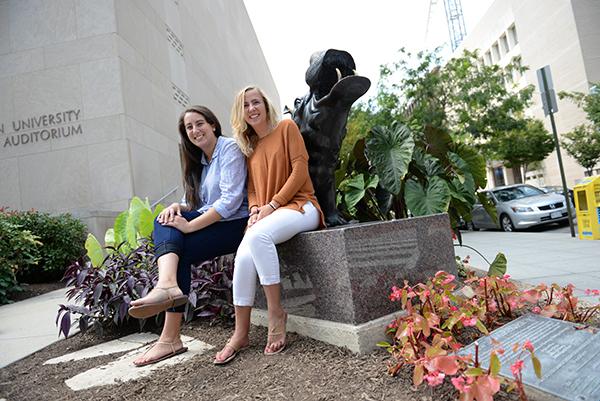Senior Class Gift coordinators unveiled an eye-popping participation goal last week, asking more seniors to give than ever before as GW enters the public phase of its $1 billion fundraising campaign.
The University is challenging at least 60 percent of the Class of 2015 to donate to their alma mater. Officials hope that if more seniors make donations before leaving GW, they’ll be more willing to give gifts in the future, expanding GW’s donor pool and creating a culture of giving back.
“It wasn’t just a number that popped out of nowhere. You want a number you know you can hit and that is sustainable,” said Michelle Ryngel, one of the coordinators.
Several of GW’s peer schools have historically set higher participation goals for their senior classes. Northwestern University made 66 percent its goal last year, while at the University of Southern California, 96 percent of seniors made donations.
Last year’s Senior Class Gift participation target of 55 percent was a more than 10 percent increase from three years ago.
But unlike in past years, when students gather this May to celebrate their final weeks at GW and announce the total amount raised, a donation matching the participation rate won’t come with the class gift. Chair of the Board of Trustees Nelson Carbonell, who has encouraged seniors to donate with the promise of a matching gift since 2010, will not make a donation this year, Ryngel said.
Carbonell has given more than $156,000 to the University’s financial aid fund for the Senior Class Gift challenge over the past four years. Last year, he and his wife donated $55,000 to match the class participation rate, and also raffled off two front-row tickets for graduation on the National Mall to further motivate seniors.
Group challenges help bring in donations because they make students feel like their gifts will have a “greater impact,” said Rob Henry, executive director of emerging constituencies and online programs at the Council for Advancement and Support of Education. He said such campaigns can especially motivate students to give when they see their classmates participating as well.
And when students donate once, they’re more likely to get in the habit of continuing to give, Henry said.
“You’re trying to build that pipeline, but you’re also trying to get students to put you in their pipeline,” Henry said.

Alumni participation made up about one-third of total fundraising hauls at 125 other colleges nationwide, according to a report by the Council for Advancement and Support of Education. GW has historically struggled to pull in donations from alumni, falling short of its competitor schools.
Ten of the 13 schools GW considers its peers had higher rates of alumni giving in 2012, the latest data available, according to analysis by U.S. News & World Report. Boston University, another peer, matched GW’s rate of about 9 percent that year.
Alix Cohen, the other Senior Class Gift coordinator, said this year the committee will again encourage seniors to sign up for five-year gifts, which she said help “promote a culture of philanthropy” at GW. Last spring, about 300 seniors agreed to give annually for the next five years.
So far, GW’s efforts to build momentum have worked. The University grew its donor pool last year to more than 22,000 donors, up from about 19,000 the previous year.
Running a successful Senior Class Gift campaign could also bode well for the future of GW’s $1 billion campaign, said Arthur Criscillis, a higher education fundraising expert at the consulting firm Alexander-Haas.
The University is already about halfway to reaching its goal of raising $1 billion, which will go toward academics, student support and construction.
“It’s a great way to help students understand the important role that philanthropy plays in the strength of an institution before they actually graduate,” Criscillis said. “It engages soon-to-be alumni in important ways and that engagement can continue after they graduate.”
Cohen and Ryngel said they’ll publicize fundraising totals throughout the campaign to build excitement as the year continues.
“It makes it more realistic for people to put a solid number behind it and realize the impact of their gift,” Cohen said.
Like in past years, seniors will be able to make gifts to specific areas of the University like Greek life, Alternative Spring Break trips or the financial aid fund. Cohen and Ryngel will target parts of the student population, hosting events for specific groups such as Greek chapters or sports teams.
“If you ask any senior why they give, it’s because ‘Oh, there was this aspect of GW that I really liked and made my experience,’ or on the flip side, ‘There was something here during my four years that I’d really like to see improved,’” Ryngel said.







